5 Things to Compare When Choosing your Next Accounting Software
An effective accounting system must be in place for medical practices to help ensure their invoicing is precise and timely. To that end, modern accounting software can help medical practices in a host of ways such as tax planning unique to the medical industry, talking about unique medical initiatives, and giving details on resources accessible to practitioners among other things.
Two frontrunning software that are supporting small and medium healthcare businesses to achieve all that and more are Zoho Books and Quickbooks. These are comprehensive cloud-based accounting applications that handle all a company’s accounting requirements, including managing payroll, tracking inventory, transaction monitoring, and accounts payable and accounts receivable. This enables businesses to easily keep track of individual transactions and manage multiple time sheets for various projects.
Just like in the last blog where we compare Sage and Xero, in this piece, we have covered everything you will want to know about Zoho Books and Quickbooks. Whether you run a pharmacy, or dental practice, or work as a sole trader, you can get a head start on deciding which is best for your healthcare business. We will examine prices, features, applications, and more to ensure you are equipped enough to choose the one best for your business.

Zoho Books vs Quickbooks – A Comparative Overview
Zoho Books, a cloud-based accounting software, is implemented by businesses of all sizes and geographies to manage and monitor their accounts. The platform is provided by Zoho Corporation, an Indian developer of business and productivity software. Reliable and easy-to-use cloud financial software Zoho Books helps effectively carry through your company’s bookkeeping and accounting chores. With features like bank reconciliation, basic accounting, automated workflow, tax management, and more, Zoho Books enables you to understand the financial health of your healthcare business at any moment and make improvements.
Quickbooks is one of the most widely used small business accounting software programs available today. It was created by the US-based software development company Intuit. This online accounting program benefits your company in a variety of ways, including managing payroll, invoicing, monitoring expenses, bookkeeping, etc. Quickbooks automates the queuing and classification of financial transactions, which helps businesses get back a significant amount of time. Its simple UI and incredibly user-friendly software make it possible for anyone without any accounting experience to utilize the platform with ease.
Zoho Books or Quickbooks – 5 Points of Difference
Pricing
Zoho Books: For small enterprises with annual turnover under $50,000, Zoho Books is free. Numerous features, like the client portal, recurring invoices, and automatic payment reminders, are shared by all subscription options for Zoho Books. It provides a dedicated client interface, automated payment reminders, and the ability to produce up to 1,000 invoices annually in several languages, among other features. Additionally, Zoho has five different priced plans, allowing companies of all sizes to find a solution. For an annual membership, costs range from £12 to £190 per organization every month, while monthly costs range from £16 to £220. A 14-day free trial of the app is also available.
Quickbooks: EasyStart, Essential, and Plus are the three-monthly membership packages offered by Quickbooks. Further, For self-employed professionals and freelancers, subscription costs begin at £12. These plans range in price from £25 to £160 each month. The highest-priced subscription includes a number of extra functionalities, including project profitability tracking and inventory management. Similar to Zoho Books, Quickbooks offers the basic functionality set for all subscription options, including support for numerous bank accounts and automated transaction categorization. Before making a purchase, consumers get a 30-day trial period with Quickbooks to learn more about the software.
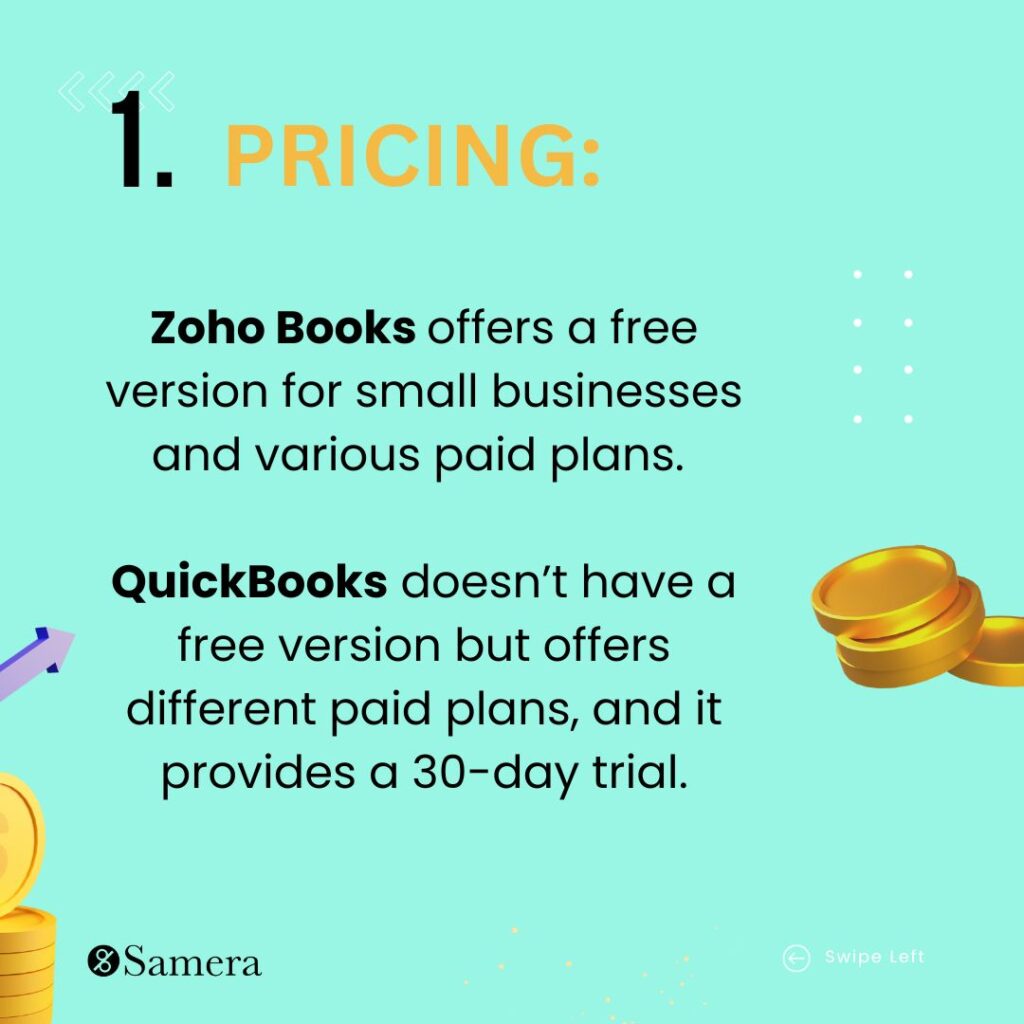
Integration
Zoho Books: About 40 business apps can now be integrated with Zoho Books. As Zoho Books smoothly connects with other Zoho platforms like Zoho CRM Plus, Zoho Workplace, Zoho People Plus, and many more, it is an excellent alternative for businesses which currently use Zoho products. You will not have any trouble setting up a unified workflow if you utilise other Zoho products. Alternatively, you may also link many other apps to Zoho Books via web-based cloud integration products available online.
Quickbooks: When it comes to integration, Quickbooks supports a wide variety of independently created and purchased programmes that can be downloaded through the Quickbooks app store. More than 650 applications may be integrated with Quickbooks by users to further expand the platform’s functionality. When it comes to third-party integrations, Quickbooks is even more adaptable. Everything you use is probably going to be on the list.
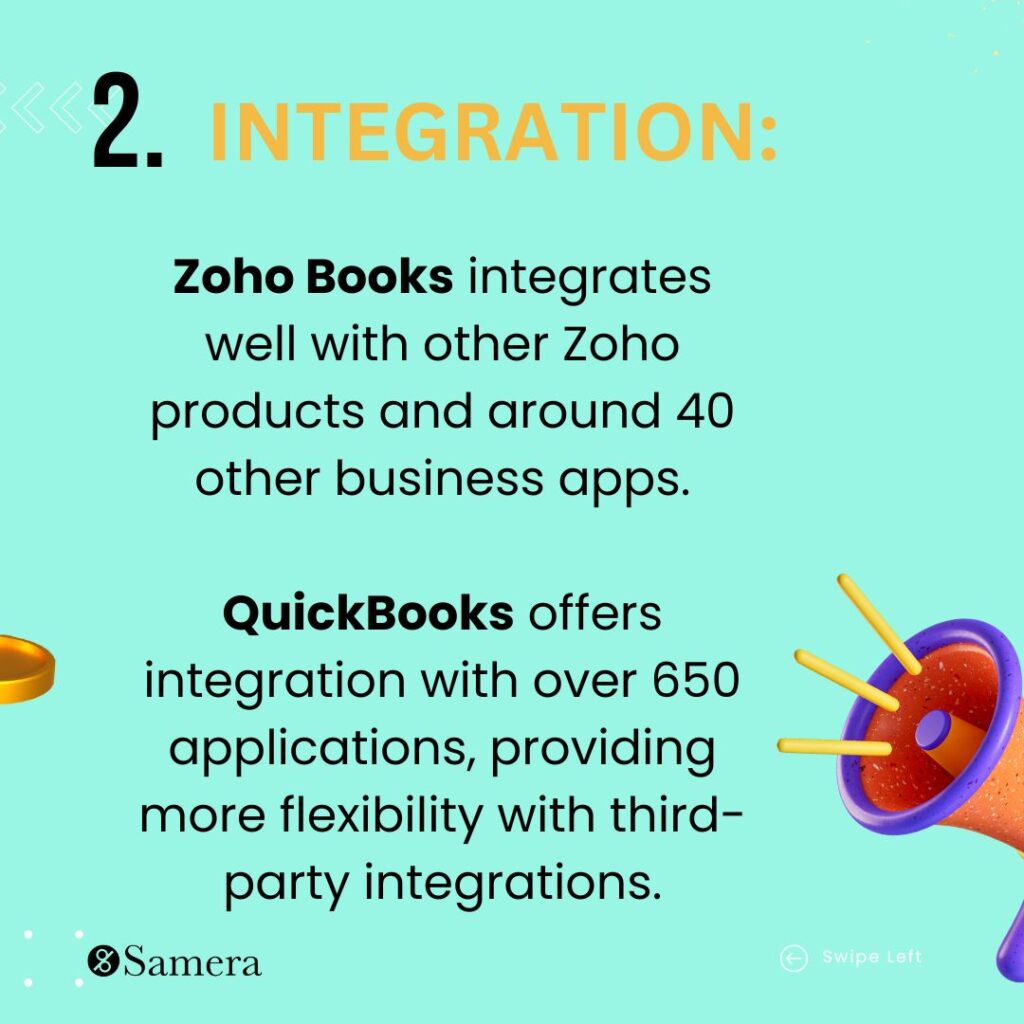
Reporting
Zoho Books: Zoho Books offer over 50 reports for you to view from. Users of Zoho Books have access to 16 editable templates. Moreover, Zoho Books offers greater language support for invoices. Businesses can automate the process of sending clients regular bills using Zoho Books, which saves them save a tonne of time and work. Retainer invoices are also supported by the platform. All PDF invoices generated by Zoho Books are encrypted, which improves security and lessens the possibility of data breaches.
Quickbooks: With Quickbooks you have access to over 80 different kinds of reports. In comparison to Zoho Books, Quickbooks offers only 6 templates for its users. It does, however, include a number of tools that assist businesses in properly raising bills for their clientele. Businesses may use the programme to produce invoices with a professional appearance and distribute them to customers via additional channels like mailers and messages. Companies may embed payment gateway and bank transfer links straight onto invoices using Quickbooks. As customers no longer need to contact businesses to make payments, this function helps to offer a better customer experience.
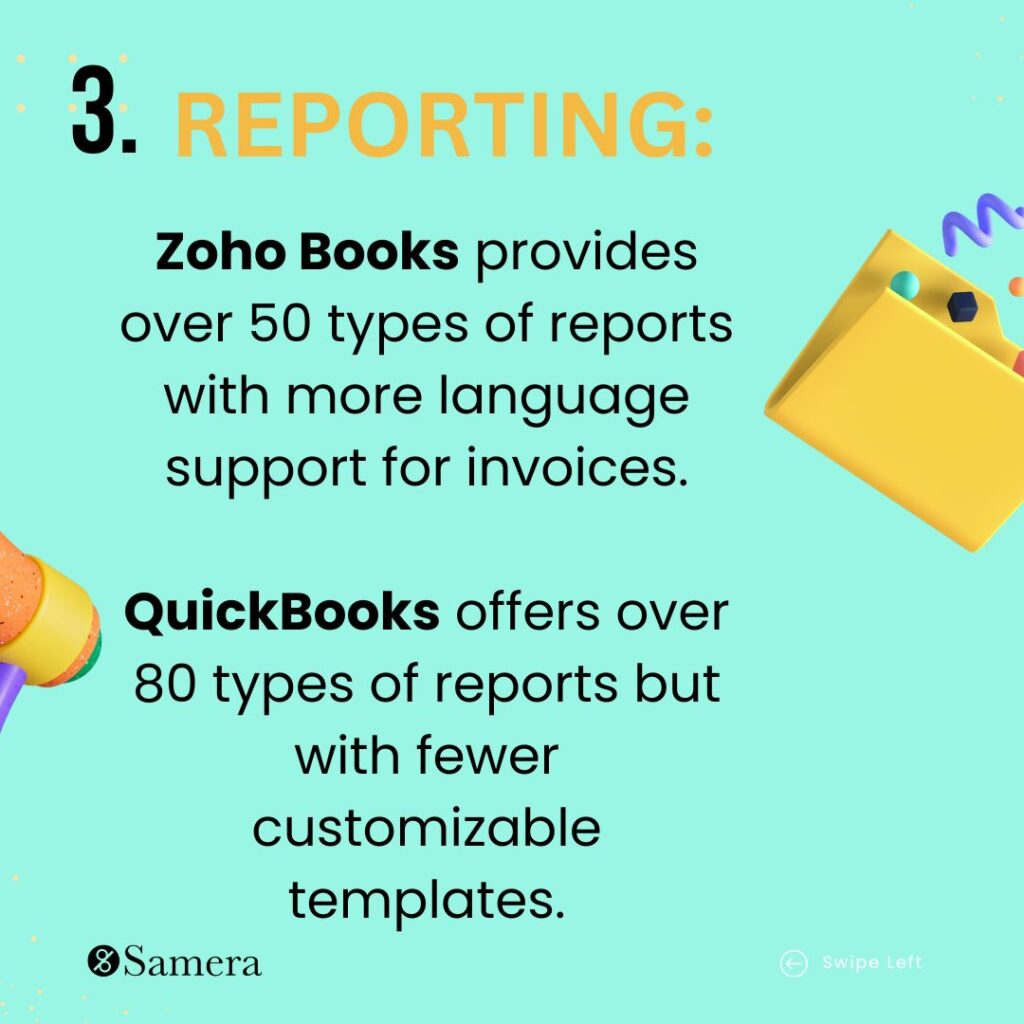
Accessibility
Zoho Books: Nobody likes to deal with challenging programs that need a lot of understanding. Zoho’s accounting product is relatively simple to use thanks to Zoho Books’ very user-friendly design. The programme provides a powerful dashboard that shows all the essential information, including cash flow, profit and loss, costs, and many other metrics. The platforms all include a left menu which can be employed to access different modules, and they all have a similar type of user interface.
Quickbooks: The Quickbooks dashboard’s simplicity and data visualisation make it easy to understand and excellent. The dashboards of both applications are simple to use. In addition, if you can’t find the feature you’re searching for, there are several manuals you may refer to. Further, Quickbooks is widely recommended for businesses that seek a solution that is quickly configured and ready to be deployed.
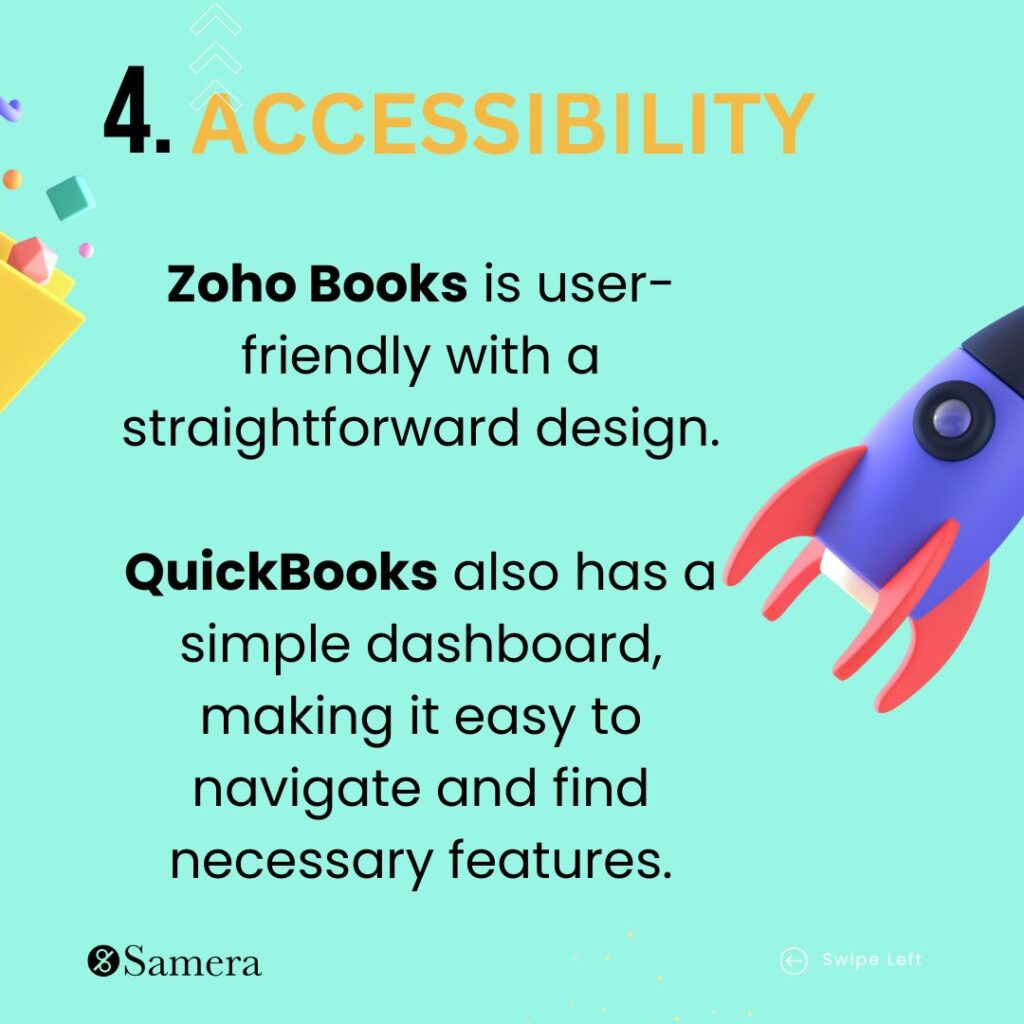
Customer Support
Zoho Books: The customer service offered by Zoho Books is one of the primary factors contributing to the client base’s loyalty to the platform. Email assistance is included in Zoho’s free plan, but phone and chat are also available in all of the commercial options. Customers laud Zoho’s customer service for its quick response times. Any software-related problems you have will be quickly resolved by knowledgeable employees. Fast replies and short wait times give Zoho Books a competitive edge and greatly increase client satisfaction.
Quickbooks: In the past, Quickbooks customer service has come under fire. Using this app’s customer care services can occasionally be a pain. Although it’s generally simple to browse, certain hidden features could take some time to discover. Thankfully, a built-in assistance feature aids in getting you back on course. Customers may also look through the platform’s extensive knowledge library if they run into problems.
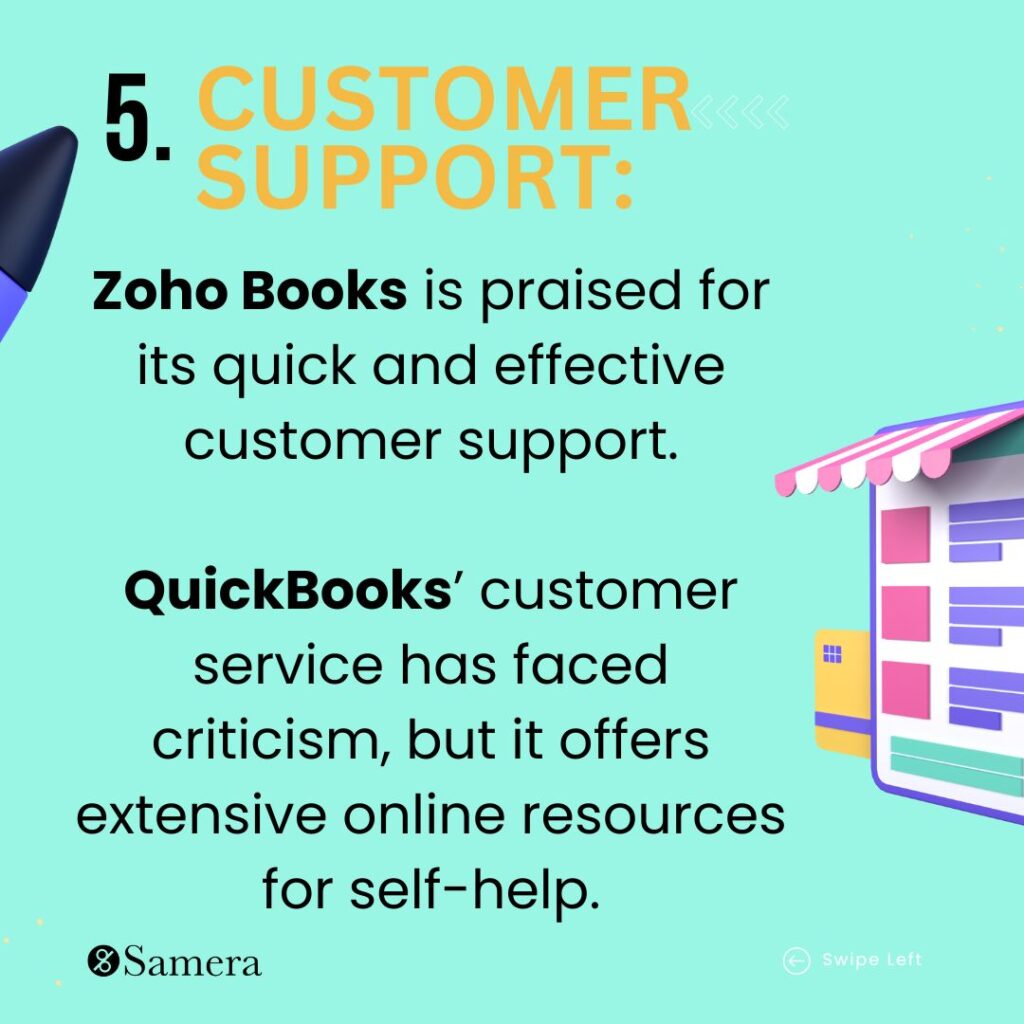
Did You Know?
- Zoho Books is the fastest-growing accounting software in India, with over 1 million users. (Source: Zoho, 2023 Annual Report)
- Quickbooks is the most popular accounting software in the United States, with over 7 million users. (Source: Intuit, 2023 Annual Report)
- Zoho Books is rated higher for customer satisfaction than Quickbooks by Trust Radius. (Source: Trust Radius, 2023 Accounting Software Customer Satisfaction Survey)
- Zoho Books is more affordable than Quickbooks for small businesses. (Source: Capterra, 2023 Accounting Software Pricing Comparison)
- Quickbooks offers more integrations with third-party applications than Zoho Books. (Source: Zapier, 2023 Accounting Software Integration Guide)
- Over 90% of users of both Zoho Books and Quickbooks say that they would recommend their chosen accounting software to other businesses. (Source: Zoho and Intuit Customer Satisfaction Surveys, 2023)
Conclusion
Both Zoho Books and Quickbooks are powerful accounting programmes that offer functionalities that are quite comparable to one another. Businesses in the healthcare industry that use one of the programmes can be able to efficiently complete their accounting chores. Businesses that already use or intend to use other Zoho platforms are ideal candidates for Zoho Books. Quickbooks will be a better choice for businesses that seek robust accounting software that can be smoothly connected with a variety of third-party applications.
Lastly, these cloud-based accounting software will definitely prove to be game-changing for small and medium-sized firms trying to streamline their accounting and bookkeeping without breaking the budget. Their free plan is an excellent place to start for a small firm entering the market for the first time. Individuals with greater requirements might pick from a variety of payment options. In the end, whether you go with Zoho Books or Quickbooks, neither of these top cloud-based accounting systems could be a bad choice for your healthcare business.
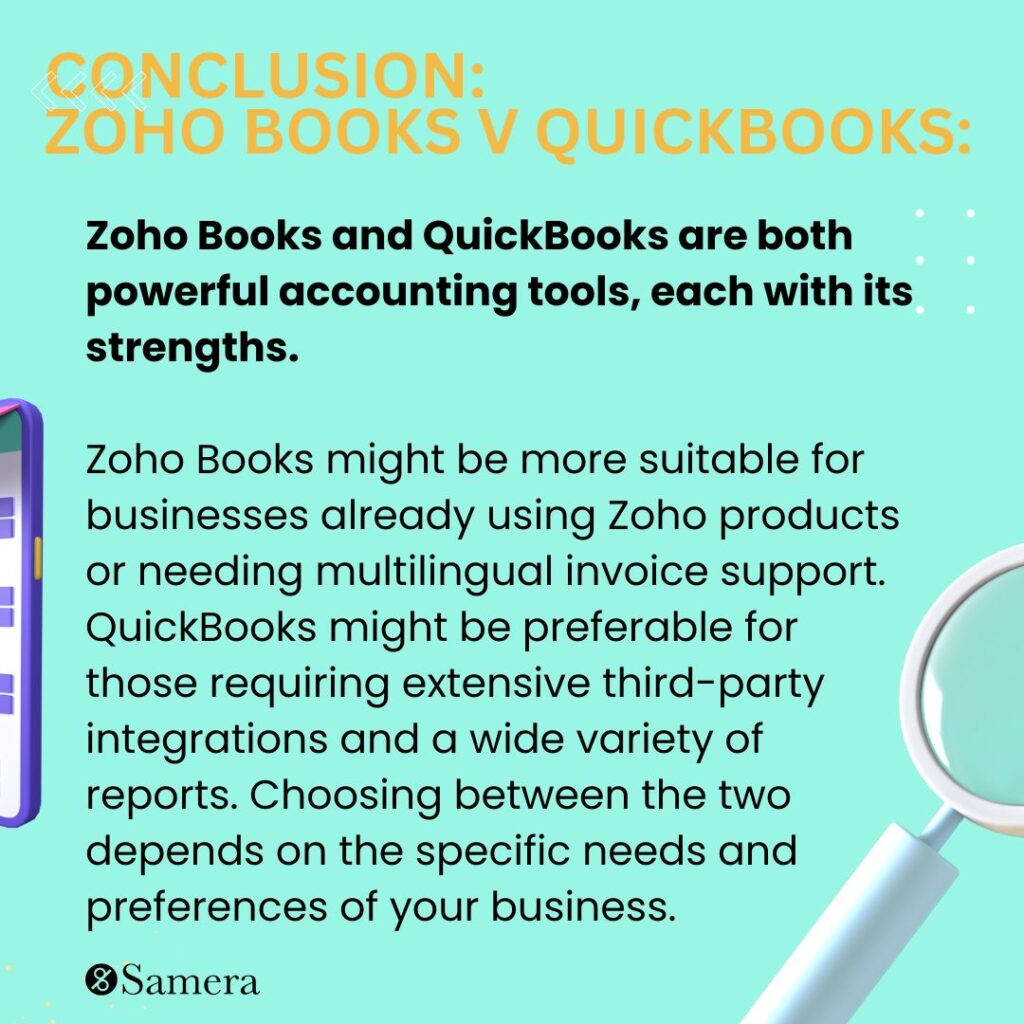
Learn more: Related Articles
About the Author

Rajat Kumar
Rajat is a finance and marketing professional with years of proven experience working in finance and investment KPOs.
Working with Samera’s business development experts, he specialises in creating tips, reports and articles helping accountants understand the global landscape, strategise and grow their business.
Reviewed By:
Arun Mehra
Samera CEO
Arun, CEO of Samera, is an experienced accountant and dental practice owner. He specialises in accountancy, financial directorship, squat practices and practice management.





